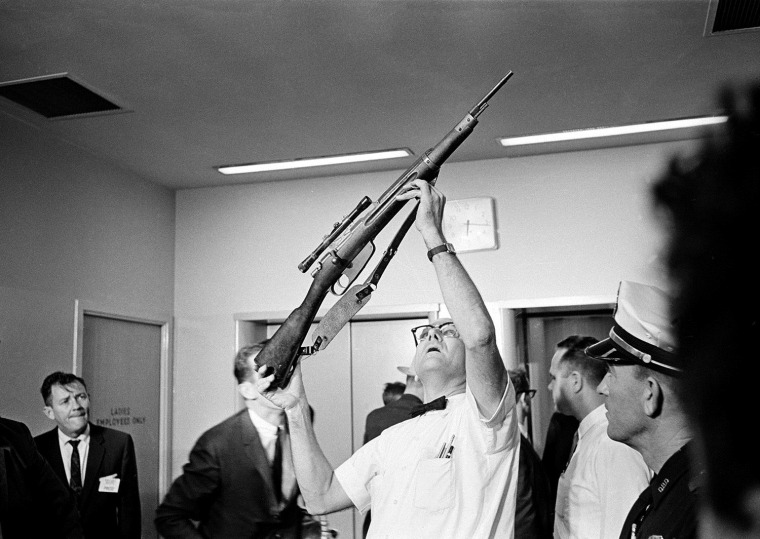The government’s most recent investigation into the assassination of John F. Kennedy began in 1994. The Oliver Stone movie “JFK” was still fresh in mind, and almost four in five Americans believed in a conspiracy to kill the 35th president.
The investigation, by the Assassination Records Review Board, was aimed at piercing the persistent secrecy that surrounded the crime. The board unearthed tens of thousands of records on the killing that had never been released.
Which makes its chairman, John R. Tunheim, among the most qualified people alive to talk about what happened Nov. 22, 1963. His conclusion: Lee Harvey Oswald did it — and no one else.
“I look back to the hard evidence of the case, the real evidence, the evidence admissible in court, and all of that points to Oswald acting alone,” Tunheim, who is now a federal judge, said this week from his chambers in Minnesota.
INTERACTIVE: ‘Everything changed’: Remembering JFK, 50 years past
Fifty years after the shooting at Dealey Plaza, the conspiracy theories of the assassination — variously blaming the mob, the CIA, Fidel Castro, a Secret Service accident, Lyndon Johnson and others — remain just that, theories.
Questions linger, and some records still remain hidden or lost forever. And most agree that the work of the Warren Commission, the government’s best-known investigation into the killing, which blamed Oswald as the lone gunman, was seriously flawed.
But no one has conclusively proved a conspiracy, Tunheim said.
“People just don’t want to believe that a 24-year-old misfit that has had really an awful life, who has these pro-communist tendencies, difficulty navigating life, could publicly assassinate the leader of the free world,” he said.
“That is still an astonishing fact to people. They want to believe that maybe there was something.”
Most Americans still believe in a conspiracy, polls show, although they are broadly divided about which conspiracy to believe. But the ranks of the conspiracy theorists are shrinking.
A Gallup poll released this month found that 61 percent of Americans believed that more than one person was involved, the lowest figure since the 1960s. An Associated Press poll this year had similar results.
The Warren Commission’s report, 888 pages long, concluded that the shots that killed Kennedy were fired by Oswald from a sixth-floor window at the Texas School Book Depository, along Kennedy’s motorcade route in Dallas.
It cited ballistics evidence, eyewitness testimony, film of the assassination and expert analysis. It found no evidence that shots were fired from the so-called grassy knoll along the motorcade route, or from anywhere else.
The commission also found no evidence of conspiracy in the killing of Oswald — two days after Kennedy's assassination, on live television, in the basement of a Dallas police station — by Jack Ruby, a nightclub owner.
Oswald was a former marine who had defected to the Soviet Union and returned to the United States, and associated himself with the Fair Play for Cuba Committee, a pro-Castro organization.
But the commission found no reason to believe that any of Oswald’s associations played a role in the killing, nor that he was a covert agent of the FBI, the CIA or any other government agency.
In 1979, a special House committee looking into the assassination concluded that Kennedy “was probably assassinated as the result of a conspiracy,” and that Oswald fired the fatal shot.
But the House committee conceded that it was unable to identify any other gunman or spell out the extent of the conspiracy. It ruled out the involvement of the Secret Service, the FBI, the CIA, Cuba, the Soviet Union and, broadly speaking, organized crime.
The House committee said that acoustics evidence “establishes a high priority” that two gunmen fired at Kennedy. That evidence was based on a long-overlooked recording made by a Dallas police officer with an open microphone on his radio.
Three years later, however, the National Academy of Sciences put together an acoustics committee that studied the tape and disagreed with the committee’s findings. Noises on the recording that were thought to be gunshots might have simply been static, it said.
Then in the 1990s, the Assassination Records Review Board went back over the House committee’s work and picked up some of the trails that it had pursued but never completed.
“We never found anything,” said William L. Joyce, a retired Pennsylvania State University history professor who served on the review board. “So while they posited the existence of a conspiracy, they, too, really came up empty.”
Joyce, too, said that he believes Oswald acted alone. He and Tunheim, the chairman, both struck a never-say-never stance in interviews with NBC News and said that they are open to new evidence.
Both acknowledged gaps in the historical record that persist to this day.
The FBI and CIA had tape recordings of Oswald’s discussions in the Cuban and Soviet embassies in Mexico City in the fall of 1963 — but they have disappeared. Some records of a CIA investigation, and records kept by lawyers for Ruby, have also never come to light.
And there are surveillance files from Oswald’s time living in Minsk, Belarus, then part of the Soviet Union, from 1959 to 1962, but the review board never developed a good relationship with Belarus, Tunheim said.
All of those records would help “to really understand this man a little more, analyze a little more fully whether he could pull off this event,” he said.
Joyce said that he believes in, and hopes for, an “emerging consensus” against a conspiracy. He said that the conspiracy theorists keep alive an unhealthy “societal angst,” and that he has yet to see any reliable documentation.
“The sheer magnitude and impact of this event is so great that you’d think it would have surfaced if it was going to surface at all,” he said.
“My own feeling,” he added, “is that Oswald was lucky.”
Related:
